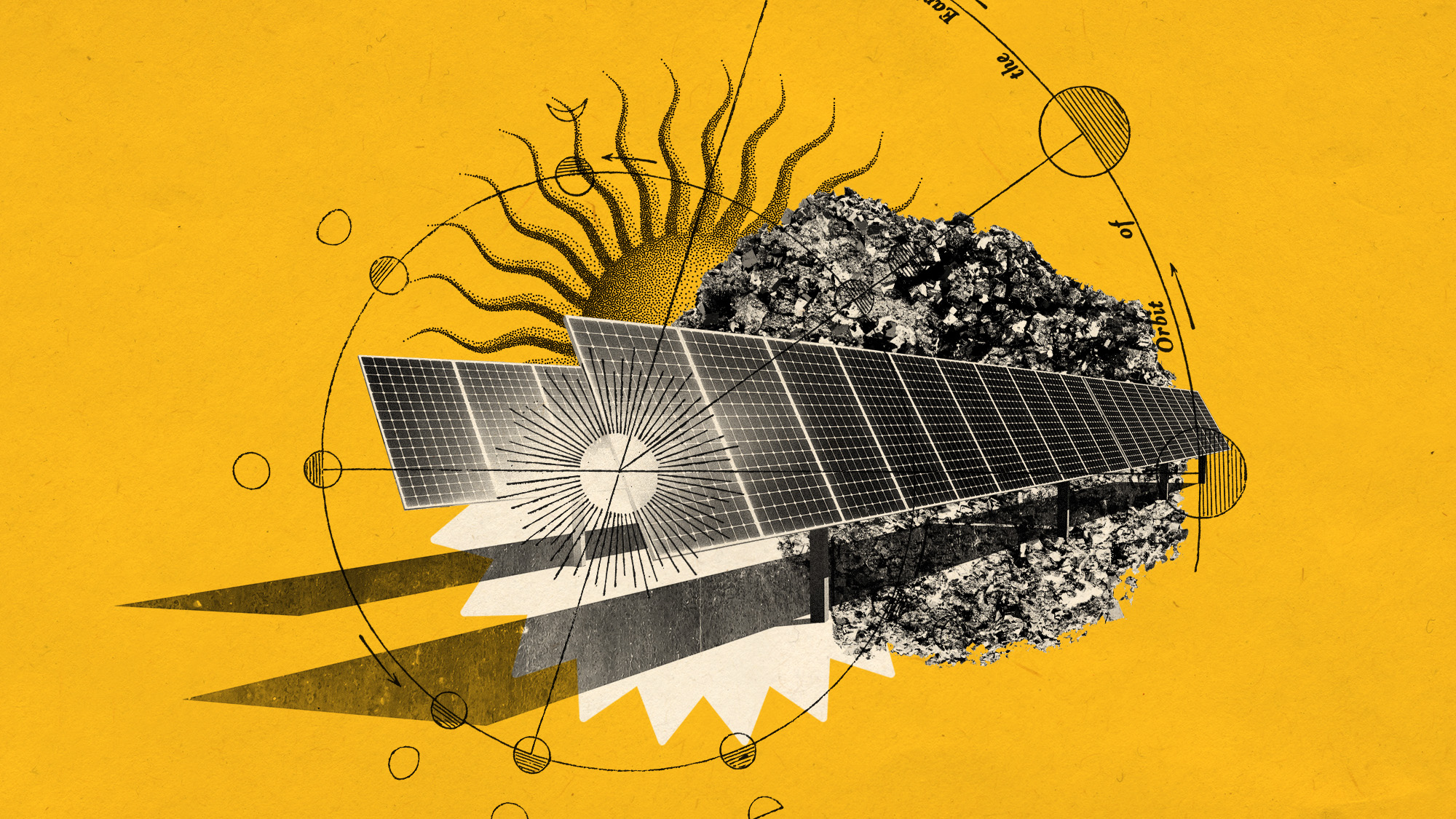Japan's new solar panel technology might forever alter the renewables market
All thanks to perovskite solar panel technology


A free daily email with the biggest news stories of the day – and the best features from TheWeek.com
You are now subscribed
Your newsletter sign-up was successful
For a long time, the solar panel market was dominated by China because of that country's control of the silicon supply chain. But the solar-panel tides may be turning, as Japan has created a solar panel that does not use silicon and instead uses a mineral-created material called perovskite. The new panels have caught up to the efficiency of traditional solar panels and are opening the door for a upheaval in the global renewables market.
A new solar system
Solar panels have traditionally been made with silicon, over which China has had majority market control. Eager to limit China's stranglehold over the solar market, countries have been searching for a different way to harness the sun. Now, Japanese engineers "believe they have found one in a type of solar cell that looks and feels like camera film," according to The Wall Street Journal. The new cell uses perovskite, a crystalline structure formed by minerals that convert sunlight into electricity. The perovskite cell was invented by Japanese scientist and Toin University of Yokohama professor Tsutomu Miyasaka. Iodine is the key element used to manufacture the solar film, of which Japan is the world's second largest producer.
Research into using perovskite for solar power has been happening during the past decade, however, the structure was less efficient than the typical silicone panels and would degrade under humid conditions. "Silicon solar cells are great because they are very efficient and can last for a very long time, but the high efficiency comes with a high cost," Xiwen Gong, assistant professor of chemical engineering at the University of Michigan, who studies perovskite semiconductors, said in a statement. "To make high-purity silicon, temperatures over 1,000 degrees Celsius are needed. Otherwise, the efficiency won't be as good."
The Week
Escape your echo chamber. Get the facts behind the news, plus analysis from multiple perspectives.

Sign up for The Week's Free Newsletters
From our morning news briefing to a weekly Good News Newsletter, get the best of The Week delivered directly to your inbox.
From our morning news briefing to a weekly Good News Newsletter, get the best of The Week delivered directly to your inbox.
To boost efficiency, perovskite was previously used in tandem cells inside glass-covered silicon panels. But now, technology has allowed silicon-free perovskite cells to match traditional silicon-panel efficiency. While humidity remains an issue, the perovskite panels have the potential to be more widely applied. The panels themselves are thin, light and flexible, unlike their silicon counterparts. "Let's say you live in an apartment and don't have your own roof. You can still put the perovskite cells on your balcony," Miyasaka told the Journal. "Think of [them] as a household appliance."
Shifting the scales
Renewable energy has become "a geopolitical football," as described by The Wall Street Journal, with countries trying to shift China's dominance in the solar energy market. Currently, Chinese companies control more than 80% of the global supply chain for silicon solar panels, and "the world will almost completely rely on China for the supply of key building blocks for solar panel production through 2025," according to the International Energy Agency.
"Look at what China is doing with semiconductors. That's bullying," Miyasaka remarked to the Journal, referring to China's export restrictions on important components used to create solar panels. "With perovskite cells, the components can be made domestically." Japan has had to import 90% of its energy since the 2011 Fukushima nuclear disaster caused the country to close down most of its nuclear plants. Japanese engineers believe that their craftsmanship will allow the country to hold on to its competitive edge because of how difficult it is to manufacture uniform super-thin perovskite layers. "The more difficult it is, the harder it will be for the Chinese to copy it," Miyasaka said.
A free daily email with the biggest news stories of the day – and the best features from TheWeek.com
Devika Rao has worked as a staff writer at The Week since 2022, covering science, the environment, climate and business. She previously worked as a policy associate for a nonprofit organization advocating for environmental action from a business perspective.
-
 Political cartoons for February 15
Political cartoons for February 15Cartoons Sunday's political cartoons include political ventriloquism, Europe in the middle, and more
-
 The broken water companies failing England and Wales
The broken water companies failing England and WalesExplainer With rising bills, deteriorating river health and a lack of investment, regulators face an uphill battle to stabilise the industry
-
 A thrilling foodie city in northern Japan
A thrilling foodie city in northern JapanThe Week Recommends The food scene here is ‘unspoilt’ and ‘fun’
-
 As temperatures rise, US incomes fall
As temperatures rise, US incomes fallUnder the radar Elevated temperatures are capable of affecting the entire economy
-
 Zero-bills homes: how you could pay nothing for your energy
Zero-bills homes: how you could pay nothing for your energyThe Explainer The scheme, introduced by Octopus Energy, uses ‘bill-busting’ and ‘cutting-edge’ technology to remove energy bills altogether
-
 Climate change could lead to a reptile ‘sexpocalypse’
Climate change could lead to a reptile ‘sexpocalypse’Under the radar The gender gap has hit the animal kingdom
-
 Why scientists want to create self-fertilizing crops
Why scientists want to create self-fertilizing cropsUnder the radar Nutrients without the negatives
-
 The former largest iceberg is turning blue. It’s a bad sign.
The former largest iceberg is turning blue. It’s a bad sign.Under the radar It is quickly melting away
-
 How drones detected a deadly threat to Arctic whales
How drones detected a deadly threat to Arctic whalesUnder the radar Monitoring the sea in the air
-
 ‘Jumping genes’: how polar bears are rewiring their DNA to survive the warming Arctic
‘Jumping genes’: how polar bears are rewiring their DNA to survive the warming ArcticUnder the radar The species is adapting to warmer temperatures
-
 Crest falling: Mount Rainier and 4 other mountains are losing height
Crest falling: Mount Rainier and 4 other mountains are losing heightUnder the radar Its peak elevation is approximately 20 feet lower than it once was
